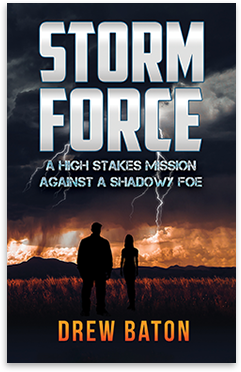
MY WRITING PROCESS
Years after I started writing Storm Force I wondered whether I should have taken more of a pre-planned approach with notes and research. At the time, a few minutes after I’d worked out where to go, I simply started writing. That works for me. I don’t start with sixty chapters lined up in my head. Even if I could, I wouldn’t be interested. The one constant is my base premise - a trio of elite mountaineers going about their business – so what do I do now? What’s the challenge? How do I develop them further? Who are they up against? Beyond that, I like to ‘roam the wilderness’, do trial and error, go down various avenues and figure it out.
I’m regularly guided by the suggestions of other authors – for example, the legendary British/Rhodesian writer Doris Lessing, and the late Clive Cussler and George Orwell. One piece of advice was to write the framework of the story and leave the accuracy of grammar and phrasing until later. Get it out of your head to where you can see it, whatever that looks like, then go back and sort it all out. Sometimes I write chapter after chapter. Sometimes, I think up ideas for later on, such as with the ending so I might draft an outline then and there. Sometimes I replace a line or paragraph at random. I might promote a later chapter to prologue status depending on what central theme I want to highlight. I might introduce a complication to spice things up or add a new dimension to a character. For example, in the next novel, Matt is ambushed by an unexpected fear. I also constantly review what I’ve written.
To achieve all of that, I must see my work on the screen.
The goal is to stay succinct, on message. When I’m reading, I don’t want to labor through a book. When Storm Force was professionally assessed, it was at seventy-eight thousand words. I was advised to knock off at least a couple of thousand. Previously I’d reached ninety thousand which I figured was too much. Stories don’t have to take forever. Doris Lessing’s The Fifth Child, an effective family horror, is one hundred and fifty-nine pages. Jim Harrison’s Revenge, eventually a Kevin Costner movie, is essentially a lengthy magazine story of hard, straight prose. You can go off track and lose the reader unless you have the material to go big and the ability to do that well. A top Hollywood soap actor once stated that studios often badly misjudge audience intelligence. People either know or they figure it out.
Sometimes I have no idea or I can’t see the forest for the trees, so I walk away and let it roll for a while, keep the brain aired. I’m always reading and/or seeing movies. I credit Netflix with plenty of intriguing, out of the box ideas. Countless times, a movie script line or scene has sent me down a certain avenue.
I find writing to be a hard – sometimes damned hard – and complicated process, but I also get to create in my chosen field and it’s a great challenge. However, most of what I start out with will have to be re-written to varying degrees.
Happy writing.
Post Views : 171